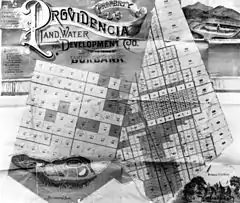Providencia Ranch
Providencia Ranch, part of 'Providencia Land and Water Development Company' property, was a piece of land in California, US. It was used as a filming location for the American Civil War battle scenes in The Birth of a Nation (1915) and some other silent motion pictures. The Valley was also the site for two Universal Studios west coast operations in 1914.

Early Universal Ranch (1912-1914)
Universal Film Manufacturing Company took over the west coast assets of Nestor Studios.[1] This included a studio in Hollywood and ranch land in the San Fernando Valley. The Nestor Ranch was located on 'Providencia Land and Water Development Company' property east of the river, just below Cahuenga Peak.
Makeshift stages were set up on the 'Oak Crest Ranch' property and the production of western films began at the former 'Nestor Ranch' site in 1912. On December 6, 1912, an informal studio opening was held at the Oak Crest property[2] The public was invited to tour the 'Oak Crest Ranch' and watch a Bison Pictures cowboys and Indians battle.[3]
After the official opening of the new Lankershim Universal City site in 1915, the Providencia ranch (Oak Crest) property would become known as the "Universal Ranch".[4]
Universal City (1914 - 1915)
Carl Laemmle, founder of Universal, saw the Oak Crest site as too small to consolidate all the west coast operations.[5] He ordered the purchase of larger property from the Lankershim Land, Water Development Co.[6] The Lankershim site contained several tracts of land, including Taylor Ranch.
Consolidation began in 1914, with the relocation of several small buildings from the Sunset Gower Studios (former Blondeau Tavern) studio and Oak Crest Ranch property. The three sections of the Lankershim property were referred to as the Universal Back Ranch and contained a zoo, cafe, horse corral and stage 2.
The Taylor ranch bordering on Lankershim Blvd. was divided by a stream. It contained the studio front lot and the backlot on the east side of the stream. The photographs of the Providencia Ranch land can be seen in the [7] a "A Birds Eye View of Universal City".
The alternate names of this filming site include Providencia flats; Nestor Ranch; Oak Ranch; Oak Crest Ranch; Universal Ranch/Universal City [Providencia site vs Lankershim site]; 1916 Lasky Ranch; and Paramount Ranch (until Nov. 1927). Today this area is Forest Lawn Memorial Park (Hollywood Hills).[8]
Birth of a Nation (1915)
The Providencia Land and Water Development Company property was used for the battle scenes in Birth of a Nation.[9] Billy Bitzer illustrates the location of the battle scenes by his hand drawn map.[10]
Lasky Ranch (1918)
"The Famous Players - Lasky Corporation have secured the "old Universal Ranch", a 1,000-acre tract within five minutes of Hollywood at a cost said to be $1,000,000. The site will be used for permanent sets and the first Picture will be a revival of The Squaw Man, which Cecil B. DeMille is to direct."[11]
Paramount Ranch
Paramount ranch: LA Times announced on November 20, 1927: “With one gesture a 1,000 acre ranch is being abandoned.” [12]
Notes
- Universal Studios Historic District consists of two studio sites in the San Fernando Valley.
- 1912-1914, Providencia Land and Water Development Company, the site today of Forest Lawn in the Hollywood Hills.
- 1914 Lankershim Land and Water Development Company, the site today of Universal City.
References
- "San Fernando Valley" By Marc Wanamaker (2011) Page 97, 103, and 106
- The New York Dramatic Mirror " Oak Crest, a film city by itself - January 15, 1913 page 49.
- Rotarian February 1914
- Early Universal City; by Robert S. Birchard
- Drinkwater
- "A Motion Picture City... "Daily Advocate, October 2, 1914 Page 6
- Los Angeles Image Archives
- Series of New York Daily Mirror articles 1912 to 1915 - Library of Congress Newspaper Archives
- G. W. Bitzer (as Billy Bitzer). Billy Bitzer: His Story. New York: Farrar Straus & Giroux, 1973.
- Ibd
- The Film Daily Wednesday, August 21, 1919 - Cover page 1
- Paramount Staff news letter
Further reading
- "San Fernando Valley" By Marc Wanamaker (2011) Page 97, 103, and 106
- "Oak Crest, a film city by itself" The New York Dramatic Mirror – January 15, 1913 page 49.
- "Universal City Visit" Rotarians Visit the Ranch see Cowboys and Indians February 1914
- "Early Universal City"; by Robert S. Birchard
- "A Motion Picture City... " Daily Advocate, October 2, 1914 Page 6
- "Scrap it" the Old Universal – 1915 Universal Tour Brochure
- The Cowboys, Indians and zoo 1914 first assets to be moved to the new Universal City. [Motion Picture World]
- "The Theatre of Science; a volume of progress and achievement in the motion picture industry" by Robert Grau : Page 287 – 1914 Broadway Pub. Co. New York
- The Life & Adventures of Carl Laemmle; by John Drinkwater (Carl Laemmle views Nestor ranch and names the area Universal City))
Universal History 1912 to 1915 – "Frickr Universal Image collection" by Dennis Dickens
External links
- November 24, 1913 Bailey, Chas. Z. Universal City
- 1911 Nestor Filmmakers at the Forest Lawn Site
- 1911 Nestor Filmmakers at the Forest Lawn Site
- 1911 Nestor Sunset and Gower
Motion PIcture Arts and Science – UCLA